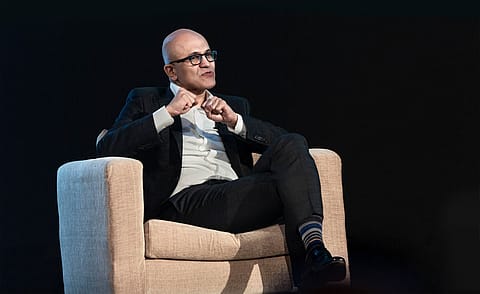The transformation of Microsoft
While Google, Facebook, Apple, and Amazon struggling with various issues, Microsoft’s reinvented business model with cloud as the new growth driver offers lessons.

With more than 95% market share of the operating system for desktops, Microsoft was the most dominant technology company of the last quarter of the last century. The fall of Windows qualifies as a case of classical disruption. The advent of the Internet reduced application lock-in, while PCs became ‘good enough’ thereby elongating the replacement cycle. And smartphones over time started taking over the PC functionality directly.
Microsoft missed out on the five biggest technology trends under the leadership of Steve Ballmer. These were search, mobile telephony, mobile operating systems, media, and cloud. Microsoft continued to be a ‘products’ company focussed on Windows, missing out on ‘services’ such as cloud, ads, and music.
Under the leadership of Satya Nadella in the last few years, Microsoft has consciously transformed itself from a ‘products and services’ company to a productivity and platform company with a cloud-first and a mobile-first focus. Microsoft’s ‘Experiences & Devices’ team is focussed on end-user productivity while the ‘Cloud+AI’ team is working to build the platform of the future.
Up, up, and away is how Microsoft’s stock has been heading with strong earnings push taking it into the $1-trillion valuation zone, eclipsing Apple and Amazon. Of the five majors—Google, Apple, Facebook, Amazon, and Microsoft—the Nadella-led firm is also the soundest on account of its revenues being securely diversified. While the three largest are Office products and cloud services, Azure server products and cloud services, and Windows, as many as eight different segments (including the three) generate 5% or more of revenue. The other five being gaming, search ads at Bing, enterprise services, devices, and LinkedIn.
Deprioritsing Windows—the once cash-cow operating system—and betting big on the cloud has paid off for Microsoft with Azure now being second to market leader Amazon’s AWS. Speaking on the earnings call earlier this year, CEO Nadella said: “It was another strong quarter, with double-digit top- and bottom-line growth, driven by the strength of our commercial cloud.” With hybrid cloud computing as another ‘funnel of opportunity’, Microsoft is all set to take on Amazon.
Recommended Stories
Beyond business focus, Nadella has also consciously created a culture of trust around a simple concept of “equitable growth” where many companies find it preferable to work with Microsoft unlike the evil empire fighting for domination and struggling with antitrust motions of an era gone by. Nadella genuinely believes in happier customers, employees, and partners with ‘inclusivity, trust, and sustainability’ as the new buzzwords.
Microsoft has also built its bridges with governments and regulators around the world by consciously working with them to support data protection and advocate cautious use of AI, unlike other big tech firms who are regularly ending up on the wrong side with the authorities.
(INR CR)
With Microsoft sitting pretty, offering everything from tasks and documents to games, entertainment and communications, while providing work and productivity experiences, the ability of Microsoft to be the leader of the pack remains unchallenged. GitHub is only one of the examples of victories coming its way even as Google was the other contender waiting in the wings.
While Google and Facebook struggle with content moderation and data privacy issues, Apple with its treatment of competitors’ services in its app store, and Amazon with its ‘kill-them-all, take-it-all’ culture, it is Microsoft which deserves kudos for reinventing a new business model with cloud as the new growth driver, invigorating the organisation with a new culture, and playing it mostly right with the governments and the regulators.
Lessons to be learnt for the other tech majors!
Views are personal. The author is Executive-in-Residence at ISB and at UCLA, and a global CEO coach and a C-Suite + Start-up advisor.